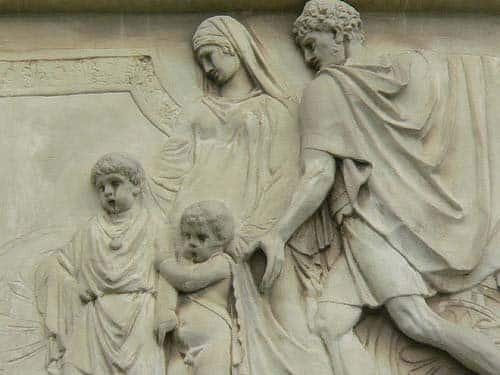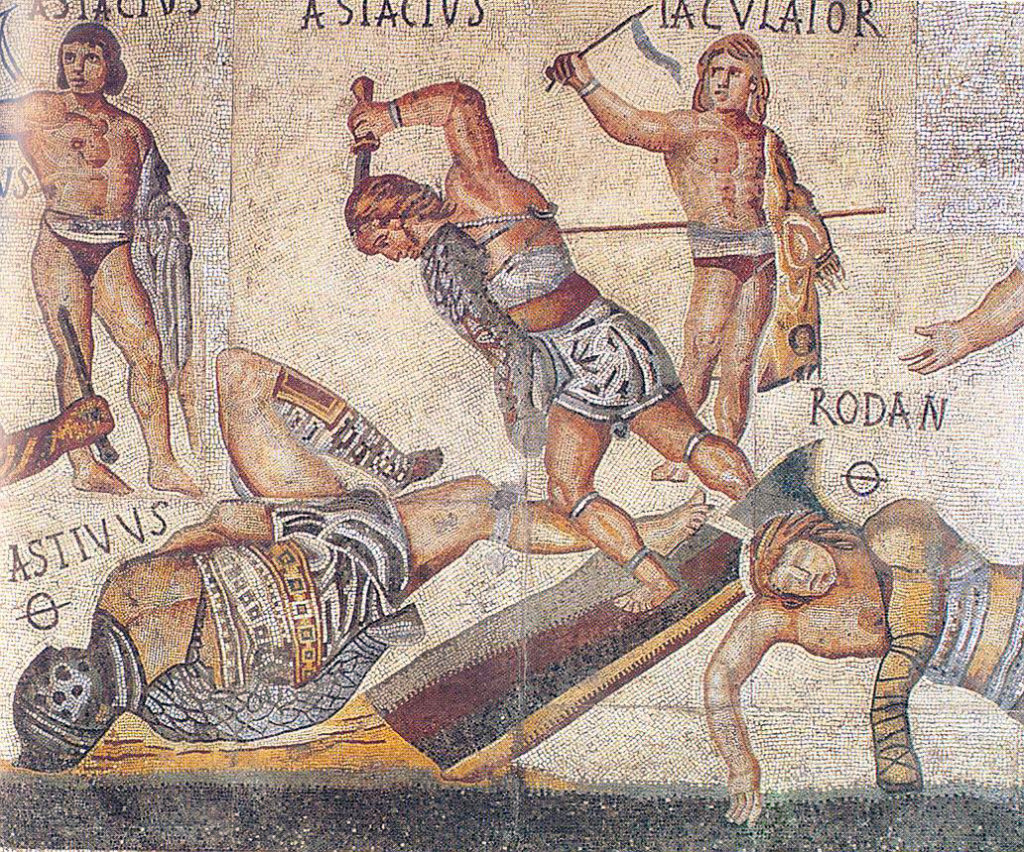Last updated on July 21st, 2022 at 10:47 pm
When Julius Caesar was assassinated on the 15th of March in 44 BC, his adoptive heir and eventual political successor, Octavian, was just eighteen.
Within weeks the young man was striving to gather military force to his cause as other allies of Caesar’s, such as Marc Anthony, scrambled for positions of power in the vacuum which had been created at the summit of the crumbling Roman Republic.
Soon Octavian was part of a triumvirate, including Anthony and Marcus Lepidus, who divided power across the republic between them.
Over the years that followed, they vied for dominance. Yet, Octavian, who was still effectively a teenager by modern standards when he materialized into Roman politics, emerged victorious in 31 BC and became Rome’s first emperor, Caesar Augustus.
All of this begs the question, what childhood did Octavian have? What had prepared him during his youth to ascend to such a height? More broadly, what was childhood like in ancient Rome?

Infant and Child Mortality in Ancient Rome
One of the critical aspects of childhood in ancient Rome is the sheer danger of it.
Many children didn’t make it past their infancy or childhood. Childbirth and the first six months of life were particularly hazardous due to natal complications and premature births.
Then in the first ten years or so of life, the diseases which have been a staple of human civilization for millennia, such as measles and influenza, were dangerous to children, which have become unimaginable since the advent of vaccines in the late eighteenth century.
Those surviving Roman children had to deal with the trauma of siblings’ passing. Those who had passed were remembered by families every year in the dies parentales, a nine-day festival in which they were honored in February.
The Roman Stages of Childhood
Today we view childhood and one’s younger years as having distinct stages. So, for instance, if one is an infant until they are about 5 or 6, they are considered a child until they reach 13 or so, when the teenage years are generally deemed to begin.
The Roman stages of childhood were not altogether dissimilar; indeed, we inherited some of our concepts concerning this from the Romans. For instance, one was considered an infant, or infantia in Latin, until they were 6 or 7.
Then they progressed to childhood. However, there was no comparable aspect to being a teenager in Roman society. Once one reached 13 or 14, society effectively considered them to be a young adult.
Childhood Education in Rome
Today, education was central to childhood. The Roman education system mirrored the education curriculum, which had evolved within Greek societies since the sixth century BC.
The rich had private tutors, while others attended the Roman equivalent of schools. There they learned how to read and write Latin well and also Greek, the language of culture.
The curriculum focused on grammar, rhetoric, and philosophy above all else, while elements of Greek and Roman mythology and literature were also included.
Boys would have been expected to excel in rhetoric, oratory, and philosophy as they got older, with the Stoic school being paramount in the latter field. Girls would have conversely been expected to learn to sew and how to run a household.
Families and Divorce in Ancient Rome
An enormous proportion of Roman children were affected by divorce. However, in contrast to the majority of pre-modern societies, the Romans were highly liberal regarding their approach to divorce.
Most societies have required married individuals to justify a legal separation by highlighting a partner’s infidelity or some other reason which necessitates an end to their union. For the Romans, it was enough if one of those involved decided that they no longer wished to be married to the other.
If they had had enough of their husband or wife, they could initiate divorce proceedings and acquire one quite easily. This ensured that many Roman children were children of divorce.
The implications of this were considerable, as it damaged the relationship between mother and child, as the children of the marriage always went to live with the father.
Of course, contact would have been maintained with the mother, but there cannot but have been an impact on the child’s psychology.
Additionally, because divorce was very common in Roman times, children often grew up with step-siblings and half-siblings. What the emotional response to all of this was is unfortunately frustratingly absent from our written sources from the time.
Adoption in Roman Times
Another element of Roman childhood that needs to be borne in mind, particularly for sons and daughters of the upper classes, is the prevalence of adoption in Roman society.
Adoption was widespread. Many Romans adopted people from outside their clan or a near relative, such as a first cousin, nephew, or niece.
Often this was undertaken as a way of choosing a worthy heir to succeed one’s self, rather than relying on the lottery of bloodlines. The pre-eminent example of this was Octavian, who was adopted by his great-uncle, Julius Caesar.
Indeed, most of the Julio-Claudian emperors who followed Caesar Augustus down to Nero in the 60s AD were adopted relatives within the wider Julio-Claudian family.
This pattern was even more extreme during the second century AD when each of the so-called ‘Five Good Emperors‘, Nerva, Trajan, Hadrian, Antoninus Pius, and Marcus Aurelius, adopted their successor. Thus, many Roman children were either adopted or else grew up in households where they had adoptive brothers or sisters.
Entering Manhood and Womanhood
In general, one began to enter their adult years around the same time that we would consider that children become teenagers today.
Indeed it was not uncommon for Romans to marry when they were as young as 13 or 14,
However, because of the patriarchal nature of Roman society, the paterfamilias, the head of a household, retained control over decisions that sons and daughters made until he died. One cannot be said to have been a fully independent adult until the paterfamilias passed.
This ensured that the Romans had an element of arrested development running through their societies, with sons in their thirties still deferring to their fathers long after we would cease to regard people as children today.
Thus, there was a peculiar contradiction in how childhood ended early amongst the Romans and often persisted well into adulthood.

